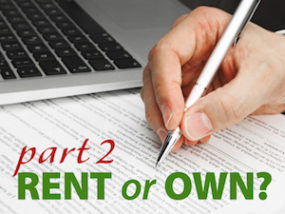 Renting vs. owning a website is a major decision for small businesses when they decide to begin, or modify, their web marketing. This is the second article in a series that covers the pros and cons of website ownership and leasing options. It is written specifically for our clients in the dude ranch, B&B inn and related distinctive lodging industries, but its principles apply to most small businesses.
Renting vs. owning a website is a major decision for small businesses when they decide to begin, or modify, their web marketing. This is the second article in a series that covers the pros and cons of website ownership and leasing options. It is written specifically for our clients in the dude ranch, B&B inn and related distinctive lodging industries, but its principles apply to most small businesses.
Last month, I covered the one thing a small business can never actually own when it comes to their website: the domain registration. If you missed it, I suggest you read Owning vs. Renting a Website – What Small Businesses Should Know.
This month, the topic is Content Management System (CMS) considerations. CMS is the administrative software (or “back-end”) of the website.
Renting vs. Owning a Website – What Does It Mean?
For the purposes of this article:
Renting/Leasing/Licensing: Content Management System, components within CMS, design elements, and/or data that are considered proprietary by the provider and are non-transferable to the rentor/lessee/licensee or third party provider.
Owning: CMS and its components, design elements, and/or data that are owned by the business and may be transferred to a third party.
Renting a Website – You Can’t Take It (All) with You
For the small business owner, renting or leasing a website is often an enticing proposition.
- Leasing typically requires only a small monthly fee instead of a large fee up front. This is seen as a way to save capital, especially for new businesses or businesses looking to sell to new owners in the near term.
- Changes and updates to the rented website are often included with the monthly fee.
- The owner of the Content Management System is responsible for the technical aspects of the website.
The true downside to renting is that whatever you don’t own will be non-transferable. If it’s non-transferable, then could it really be considered a savings to rent the proprietary software? After all, this isn’t an office space, a car or other tangible piece of property – it literally defines who you are online to the public, the search engines that index the website and so on. This is why it is crucial for the small business owner to understand:
- What is transferable
- What is not transferable
- What is exportable from the non-transferable components, and
- How is that material is delivered (i.e. what formats)
Complete rental of a website, including all data, text content and photos, is rare, but it does happen “virtually” quite frequently. By that, I mean that the website’s CMS owner does not offer a convenient or affordable method for the business to export anything – including data, text and images – even if all that material is contractually owned by the client. This forces the business to the previous website completely, use a third party service to capture what material they can, or manually copy and paste everything to the new website.
Owning a Website – You Can Have It All, But Do You Need It All?
Complete ownership of a website is also rare. Generally speaking, if some third party organization is putting together your website, then some component(s) or material is proprietary either to that organization or another. The reason for this is simple:
It is virtually impossible for a web designer to offer a true CMS ownership option to the small business owner at an affordable price because of the continually evolving standards of web development and marketing standards and the need to license technology to keep current with those standards.
So, for the purposes of this discussion, we will consider renting vs. owning a website based on the ease of the overall transferability of the CMS and the data, text and images of the website.
Renting vs. Owning a Website Often Means: How Much of Your Business Website Do You Own?

The level of a business’ true ownership of a website lies in how much they lose if the transfer to another host.
It’s likely less than you think and the contracts you sign don’t always make it easy to figure out, even if you’re experienced at reading “fine print.” It is critical to for small businesses to know what they’re paying for when signing up for services from a provider, so if you don’t know it’s up to you to find out. You may have a powerful, easy-to-use CMS, but what happens to all that value should you want (or worse, need) to transfer to another host?
InsideOut Solutions clients are always welcome to contact us with questions about any services we provide. The next article in this series will look at the options from popular providers.

